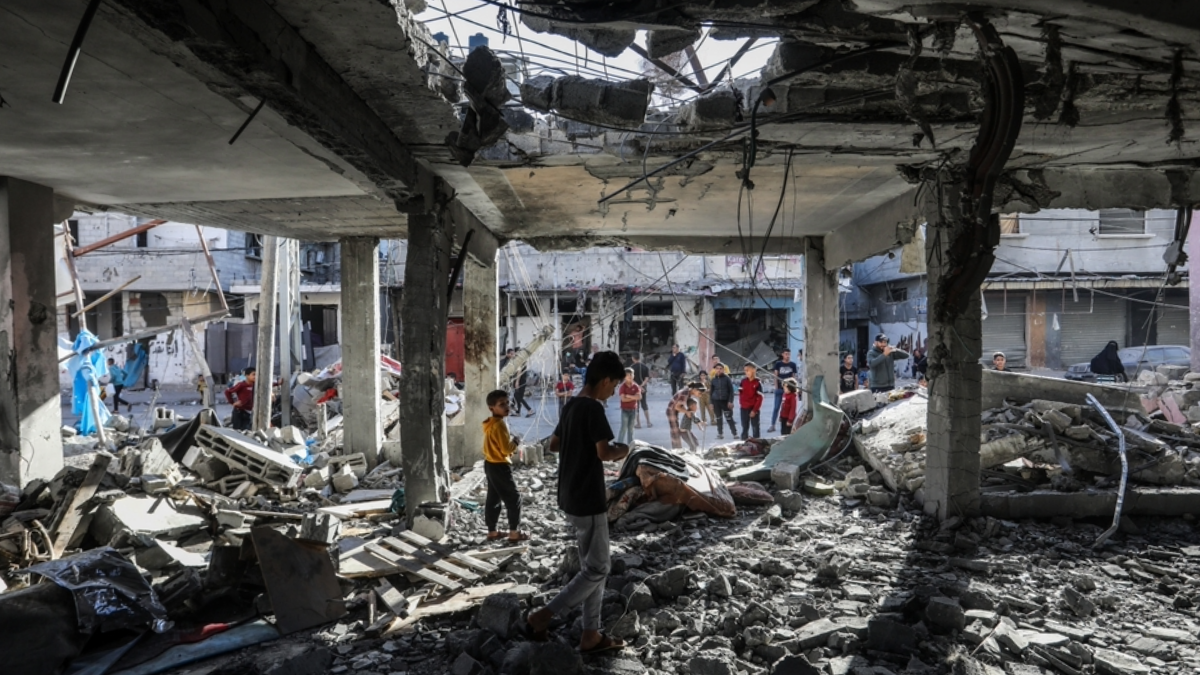Christchurch Call Signatories Must Live Up To Their Commitments to Human Rights in the Middle East
Dia Kayyali / Oct 7, 2024Dia Kayyali is one of the founding co-chairs of the Christchurch Call Advisory Network and now serves as a core committee member. This post is written in a personal capacity and does not represent the collective views of the Christchurch Call Advisory Network.

Palestinians inspect a house after an Israeli air strike in the city of Rafah on April 17, 2024. Anas-Mohammed/Shutterstock
It has been a year since the world watched in horror as Hamas took 251 people hostage and killed more than a thousand people, most of them civilians, in an unprecedented attack on Israel. In response, Israel launched an all-out military campaign, invading and bombarding Gaza relentlessly. Since then, nearly 42,000 Palestinians have been killed in Israeli strikes and a grueling ground war that has displaced nearly 2 million internally. Thousands more have died in a metastasizing conflict in Lebanon, Israel, and beyond, including many Israeli hostages who never made it home in the absence of a meaningful ceasefire.
These are not just numbers, these are lives–and they are lives that have been taken not only by the direct actions of parties to the conflict, but also with the substantial assistance of technology companies. Some technology companies have provided direct assistance to the Israeli military, and some have failed in moderating content in the region in increasingly dangerous ways.
On Friday, the Christchurch Call Advisory Network issued a statement on the one year anniversary of the war in Gaza and on the disturbing regional escalations now taking place. The Christchurch Call is an initiative that was led by New Zealand and France in the aftermath of terrorist attacks that took place in two Christchurch mosques on March 15, 2019, killing 51 adults and children from the Muslim community. The Call has a unique perspective on the role of companies and the states that have signed on to the Call and that host those technology companies within their borders. The United States is a call signatory, and has continued to supply the arms that are killing civilians. Perhaps it's not surprising, then, that US-based companies are following suit, blatantly ignoring the scale of the suffering and devastation in Gaza while doing business with those who are perpetrating it.
Today, companies that are signatories to the Christchurch Call have helped automate the silencing and mass killing of Palestinians, and now Lebanese people. Israel, Hamas, Hezbollah, and Lebanon are not parties to the Christchurch Call. However, the United States, Meta, Amazon, Microsoft, and Google, and many countries that host offices of these companies ARE Christchurch Call signatories, and they have continued to take actions that contravene the Call’s underlying commitment to human rights.
Meta’s moderation of content from and about Palestine, as well as moderation of content in Arabic, have long been criticized, not only by civil society, but also by a human rights due diligence exercise conducted by a neutral third-party, and by Meta’s own employees, as shown in leaked documents. Some Meta employees even put their name on a public letter to Mark Zuckerberg demanding an end to censorship of Palestinian content.
Mass censorship of content is particularly problematic in light of the fact that user-generated content has become an increasingly important source of evidence in international justice. A ruling from the International Court of Justice (ICJ) found that Israel’s occupation of Gaza and the West Bank is unlawful, and in violation of the international prohibition on racial segregation and apartheid. In its ICJ case, South Africa “intends to provide facts and evidence to prove that Israel is committing the crime of genocide in Palestine” and more countries continue to intervene in that case. The ICC has also sought arrest warrants for not only Hamas leaders but also Israeli Prime Minister Netanyahu and Defense Minister Gallant on charges of crimes against humanity.
What’s more, since October 7, 2023, platforms have hosted increasingly targeted dis- and misinformation and hate speech aimed at all parties to the war, and have often allowed antisemitic and Islamophobic content to flourish. Content directly inciting violence on the ground, particularly in the West Bank, has been left up on social media platforms even when reported by civil society. Google News results include posts on X from various parties to the conflict, including Israeli Defense Forces and the government of Iran. Google includes this sometimes inflammatory content despite the fact that X recently left the board of the Global Internet Forum to Counter Terrorism and has faced extensive criticism for its failure to moderate harmful content.
To be perfectly clear, the Christchurch Call Advisory Network does not always agree on the extent of content removal necessary to address terrorism and violent extremism. The Call itself also does not address state-sponsored terrorism or state-sponsored misinformation. But the Network has always been interested in evidence-based responses, protecting vulnerable communities, and upholding human rights. Removing content improperly, whether due to underinvestment in Arabic language moderation resources or anti-Palestinian bias, doesn’t help anyone.
More disturbingly, there are reports that data from Meta subsidiary WhatsApp may be feeding into Israel’s artificial intelligence based system “Lavender," which generates targets for assassination and which, according to six Israeli intelligence officers, has led to the deaths of thousands of women and children. A WhatsApp spokesperson has denied these allegations.
Several signatories to the Call have directly supported Israel’s military capabilities, most notably Google and Amazon. In 2021, Google and Amazon employees published an anonymous statement calling on the companies to end their involvement with Project Nimbus, a $1.2 billion contract to provide cloud services for the Israeli military and government that enables “further surveillance of and unlawful data collection on Palestinians.” A report from Time indicates that Google has taken on even more business since October 7, contracting directly with the Israeli Ministry of Defense to allow it to store and process data and access AI services. Microsoft also previously supplied extensive cloud storage to the military, and all three companies continue to supply artificial intelligence services to the Israeli Defense Forces. While the companies have downplayed the importance of this project, a recent Wired article tracked myriad public documents and statements emphasizing its essential importance to Israel’s military.
These companies have a responsibility, under their call commitments and the UN Guiding Principles on Business and Human Rights, not to aid the mass killing of civilians, nor to violate their rights to freedom of expression, freedom from discrimination, and more. They are not meeting those obligations.
In addition to their commitments under the Call, all states–including the US–have an obligation under international law to ensure that companies domiciled within their borders are not contributing to violations of international humanitarian and human rights law. State obligations and company responsibilities are especially heightened in contexts of war and armed conflicts.
Tech policy is about more than content moderation, although bad moderation can–and in the case of Palestine, should–constitute a human rights violation. Tech policy is also about more than transparency, although this is extremely important as well. If we had better transparency we would perhaps know more about the role of companies in silencing Palestinian voices and aiding indiscriminate strikes that are killing civilians, rather than learning about it from whistleblowers.
Tech policy must also be about ensuring that technology companies are not aiding the mass killing of civilians–especially when the ICJ is considering whether that mass killing constitutes a genocide. Big corporations have a long history of engaging in and facilitating human rights abuses. Today, several signatories to the Christchurch Call seem to be following suit. It’s time for them to truly live up to their commitments, and for the violence in the Middle East to stop.
Authors
